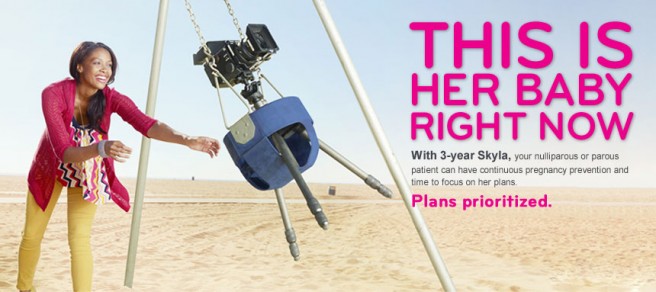Taking Care of All of Us: Young Parents and the Culture of Shame

Posted by Samaria
December 11, 2014
 Via the Skyla website
Via the Skyla website
I was ecstatic to see advertisements for the newest IUD on the market, Skyla, in the monthly women’s magazines I subscribe to. I was less than pleased about the content of the ads themselves. They feature cheery young women with different props or in different settings that are emblematic of childhood: a baby carrier here, a playground there. The tagline of these ads is “This is my baby right now” as she plays with or cuddles something that symbolizes her passion; one of the women pushes her tripod on a swing and another waits at the bottom of a slide for her violin. “Plans prioritized,” the ads gush. Skyla is the first IUD that was created and tested specifically for people who have not given birth yet, so it makes sense that the ads’ would focus on a target audience in their teens and early twenties.
But surely there’s a way to encourage contraceptive use without imagery and phrasing that is mildly condescending toward young parents? It’s definitely a delicate balance to work, especially when the phrases themselves are ambiguous. Perhaps “this is my baby” would not read as a judgment call if, rather than a woman cuddling a stack of books she carries around campus in a baby carrier, her college experience was featured alongside many other life scenes. “Plans prioritized” and “this is my baby” where there is an actual child in the ad alongside their parent, maybe, so that exercising reproductive and sexual agency doesn’t have the chance of leaving teen and other young parents feeling vaguely ashamed of themselves.
It’s perhaps one of the more difficult lines to walk as a reproductive justice activist. I strongly believe in encouraging healthy sexual decisions among teens and young adults through comprehensive sex education at all stages of life, unrestricted access to birth control (especially long-term methods like Skyla and the implant) and gynecological services, and full patient confidentiality. All of these things improve sexual health among young people and drive down unplanned pregnancy rates, which help them do exactly what the Skyla ads encourage them to: organize their lives as they see fit to. Everyone deserves full control over their reproductive selves, of which self-determination is a huge part, and teens have proven that when resources are available to them, they are capable of taking responsibility for themselves. I also am not ignorant of the ways pregnancy can lead to complications for both teens and their children, such as the fact that the parents’ bodies are less developed and therefore less equipped to handle the physical stresses of pregnancy, which in turn leads to greater chances of developmental complications in their children.
But young parents do not need guilt-trips, not subtle digs from contraceptive companies or their state government or clothing businesses. They need support from all corners. Reproductive justice is not only about birth control and abortion. It’s also about eliminating and reforming the systems in place that contribute to poverty, lack of education funding, environmental pollution, exorbitant medical fees… Things that impede strong safety nets for young parents, add to the stresses of daily life, and prevent them from accessing the necessary information and care needed to make sound decisions for themselves in the first place. Shifting the discussion about young parents away from “preventing teen pregnancy” to “supporting teens’ reproductive decisions” would not mean that the reproductive justice community is encouraging teen pregnancy. It would mean that we do not place conditions on young people’s worth.
Leave a Reply
You must be logged in to post a comment.

